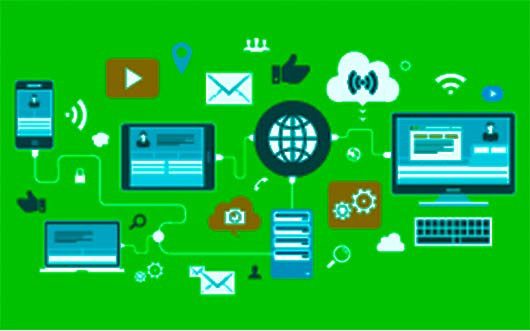The Information and Communications Technology (ICT) industry has been rapidly expanding in recent years. This industry covers a broad range of activities, from web design to computer programming. It is even responsible for developing the basic infrastructure of the Internet, such as 4G and 5G networks.
With so many advancements in ICT, it can be difficult to keep up with the latest technologies and trends. That’s why we’ve put together this comprehensive guide on ICT – everything you need to know about this exciting and ever-evolving industry. Read on to learn more!
What is ICT?
The term ‘ICT’ stands for Information and Communication Technology. It covers all technologies that are used to handle, process and store information, as well as those that are used to communicate with others.

Some common examples of ICT devices and applications include:
- Computers
- Laptops
- Tablets
- Smart phones
- Apps (such as social media, productivity and educational apps)
- Operating systems (such as iOS, Android or Windows)
The different types of ICT
There are many different types of ICT, each with its own set of features and capabilities. Here is a brief over view of the most common types of it:
- Computers: Probably the most common type of ICT, computers are used for a wide range of tasks including word processing, data analysis, email, internet browsing, and much more.
- Smart phones: A relatively new type of ICT, smart phones are becoming increasingly popular due to their portability and convenience. They can be used for a variety of tasks including making phone calls, sending text messages, taking photos, and accessing the internet.
- Tablets: Another relatively new type of ICT, tablets are similar to smart phones but larger in size. They can be used for many of the same tasks as smart phones but are often better suited for tasks that require a larger screen such as watching videos or working on documents.
- Television: While not traditionally thought of as an ICT, newer television sets are increasingly incorporating computer technology. This allows them to be used for a variety of tasks beyond just watching television programs including streaming videos from the internet, playing video games, and more.
The benefits of ICT
There are many benefits of ICT, which can be divided into five main categories:

- Productivity: ICT can help to increase productivity in both the public and private sectors. For example, online tools and applications can help people to work more efficiently and effectively.
- Economic growth: ICT can contribute to economic growth by creating new job opportunities and businesses. It can also help to reduce costs and improve efficiency in existing businesses.
- Social inclusion: ICT can help to reduce social exclusion by providing access to information and communication for all members of society. It can also help to connect people with each other and with services that they need.
- Environmental sustainability: ICT can help to reduce the environmental impact of both businesses and individuals. For example, it can help to save energy through the use of energy-efficient devices and applications.
- Improved quality of life: ICT can improve the quality of life for individuals and communities by providing access to information, education, health care, and other services.
ICT is an essential part of modern life. It helps us stay connected with friends and family, do our work, and access important services.
ICT can also have a positive impact on our health and wellbeing. For example, it can help us stay active and independent as we age, manage chronic conditions, and connect with social support networks.
There are many other potential benefits of ICT, including reducing green house gas emissions, improving education and employment opportunities, and providing access to essential services in remote areas.
How to use ICT in your everyday life
In our fast-paced, ever-changing world, it’s more important than ever to be proficient in ICT. ICT skills are becoming increasingly valued in the workforce, and even in our personal lives.
Many everyday tasks can be made simpler and more efficient with ICT. For example, you can use your computer or smart phone to stay organized by creating digital to-do lists and calendars. You can also use online banking and budgeting tools to keep track of your finances.
Social media platforms like Facebook, Twitter, and Instagram are great ways to stay connected with friends and family. You can also use them to follow news outlets, businesses, and public figures that interest you.
There are endless possibilities for using ICT in your everyday life. The best way to learn is simply by exploring and trying new things. With a little practice, you’ll be surprised at how quickly you become an ICT pro!
The challenges
The challenges of ICT are many and varied. They include the need for expensive hardware and software, the lack of standardization, and the need for constant training and support. Additionally, ICT can be a drain on productivity if not used correctly.
How to implement ICT in your business
There is no one-size-fits-all answer to this question, as the best way to implement ICT in your business will vary depending on the specific needs and goals of your company. However, there are some general tips that can help you get started:
- Define your goals. Before implementing any new technology, it’s important to first define what you want to achieve with it. Do you want to improve communication and collaboration with in your team? Make your processes more efficient? Reach new customers? Once you know what you hope to accomplish, you can start re searching which tools will help you meet those goals.
- Do your research. Not all ICT tools are created equal, so it’s important to spend some time re searching the different options available before making a decision. Talk to other businesses in your industry and see what they’re using, read online reviews, and compare features and prices to find the best fit for your company.
- Train your employees. Once you’ve chosen the right ICT tools for your business, it’s time to train your employees on how to use them effectively. This may require hiring an outside trainer or investing in some online resources, but it will be worth it in the end when everyone is up and running smoothly with the new system.
- Evaluate and adjust as needed. Even after everything is up and running, don’t forget to periodically check in on how things are going.
Conclusion
In conclusion, ICT is an incredibly useful and powerful tool in the modern world. From its ability to facilitate communication between people across the globe to its capacity for automation of processes, it has revolutionized how we work, play, and connect with each other. With so many different uses and applications, there’s no limit as to what you can do with ICT – all you need is a bit of know ledge and creativity!


